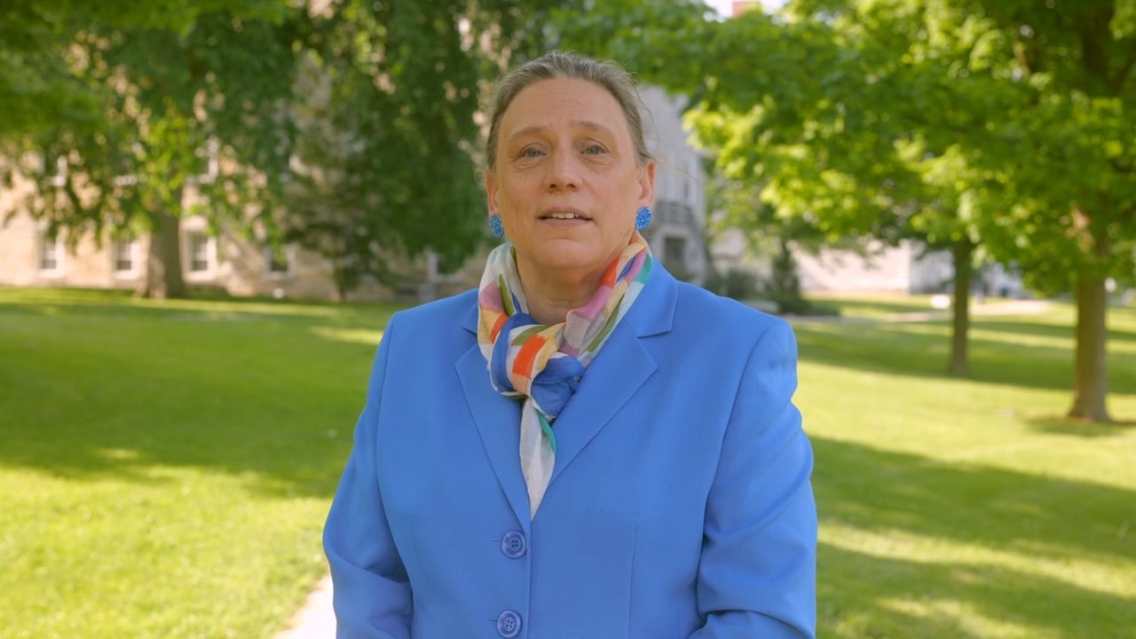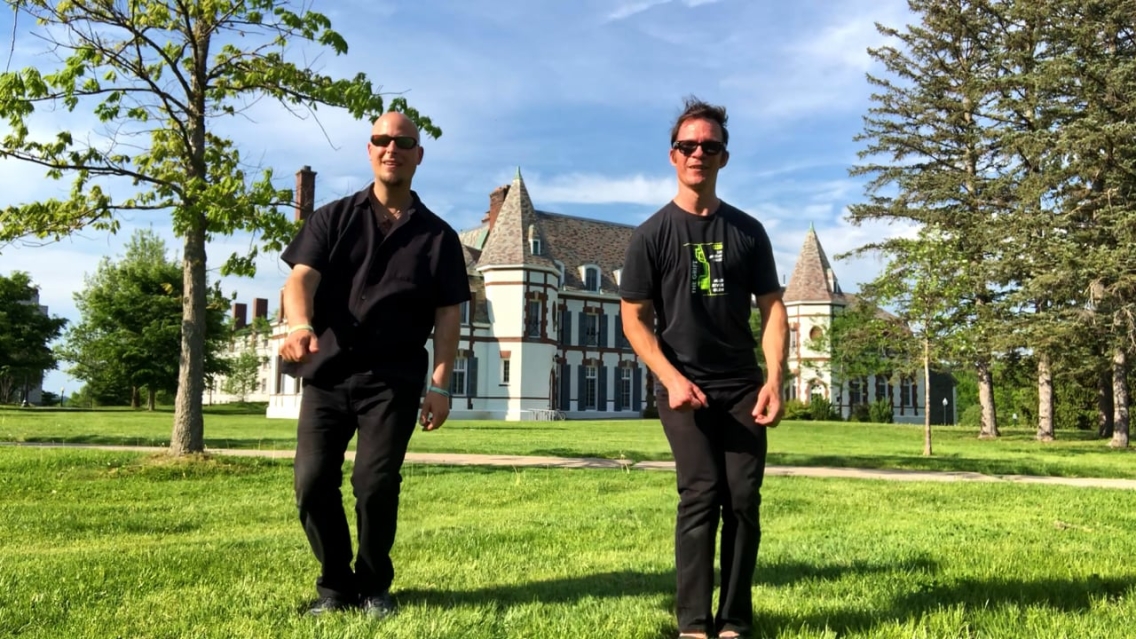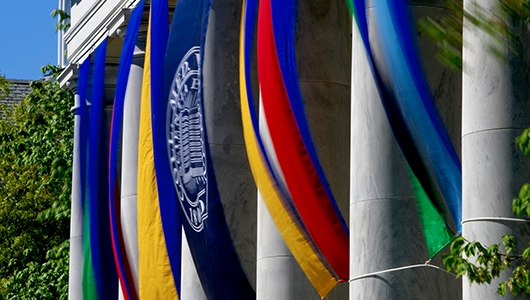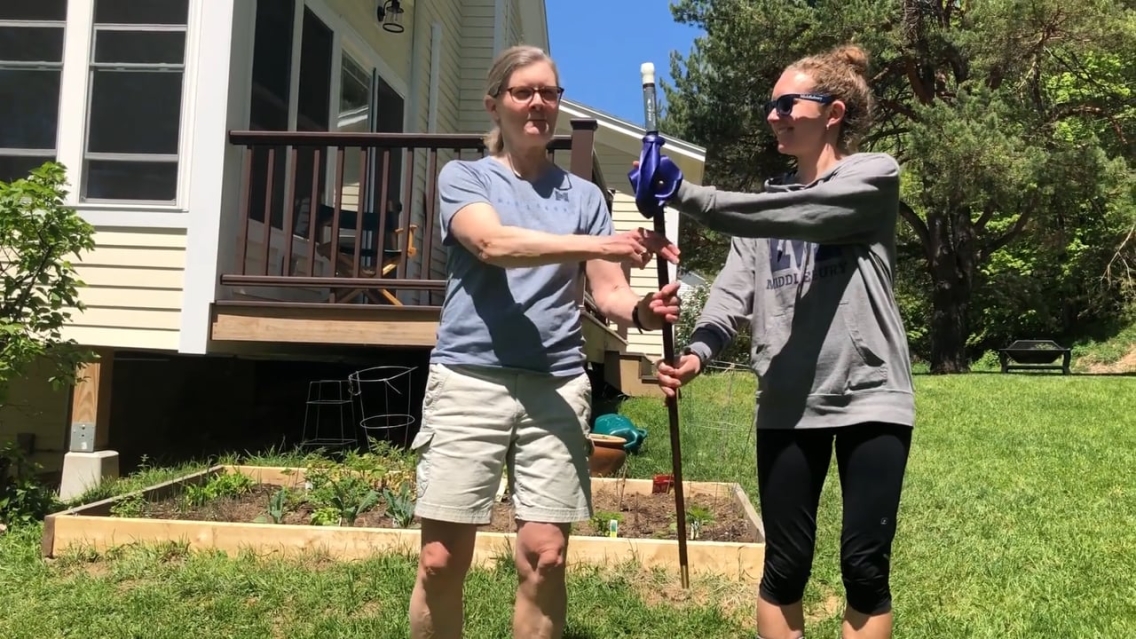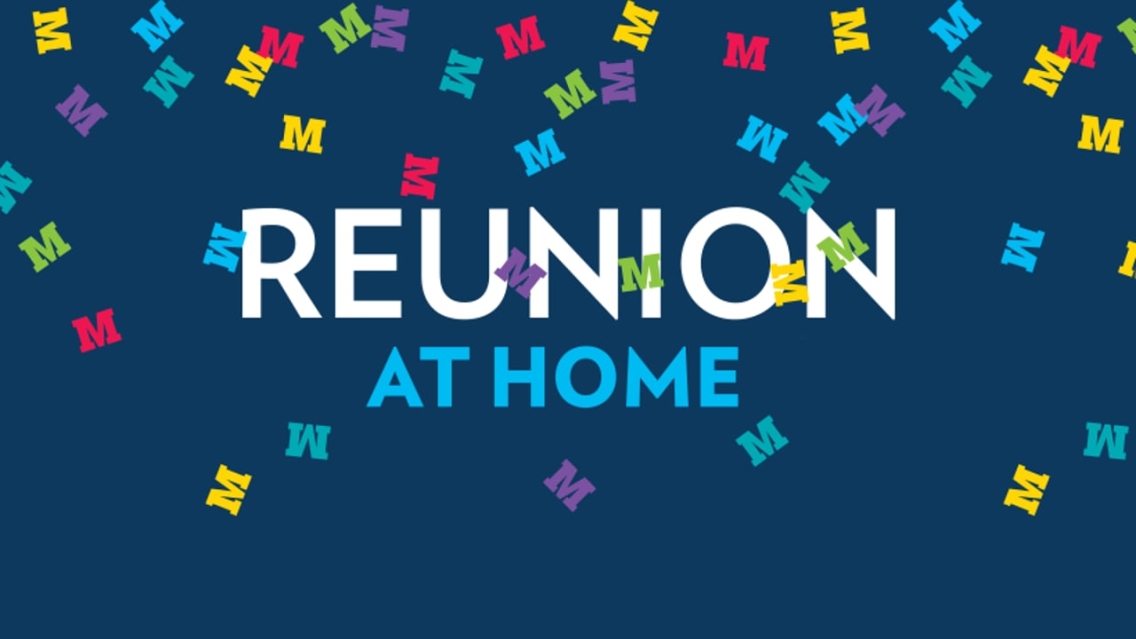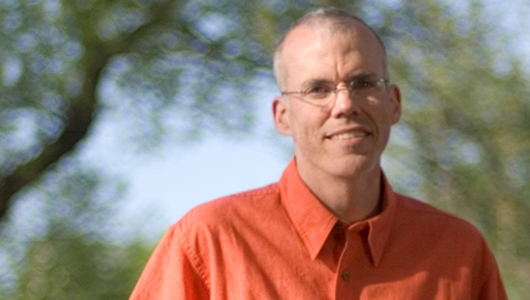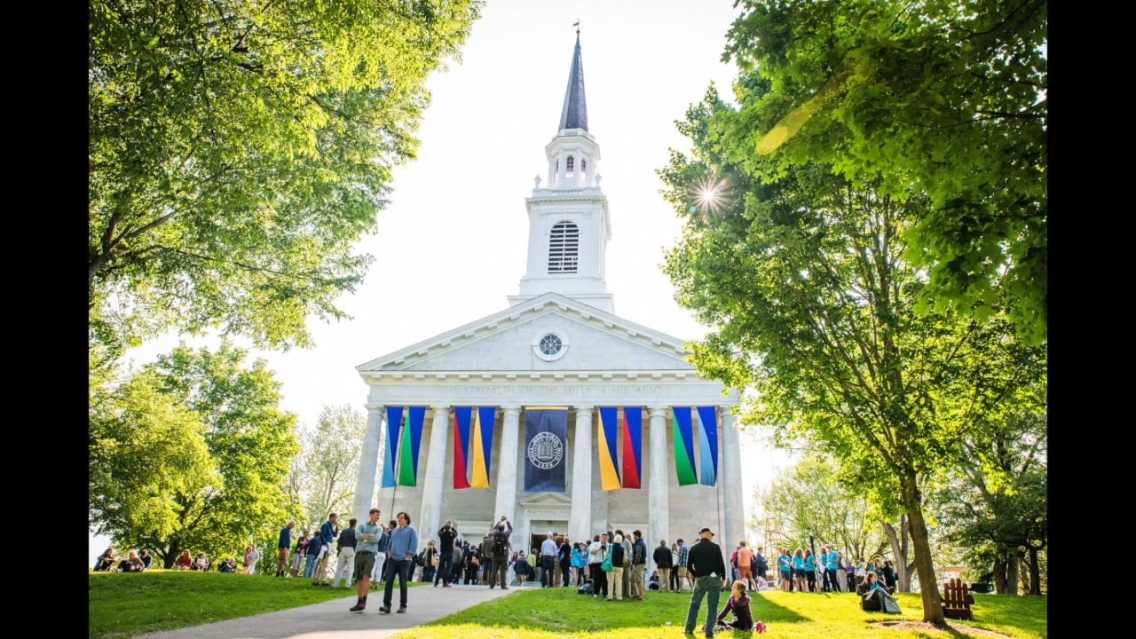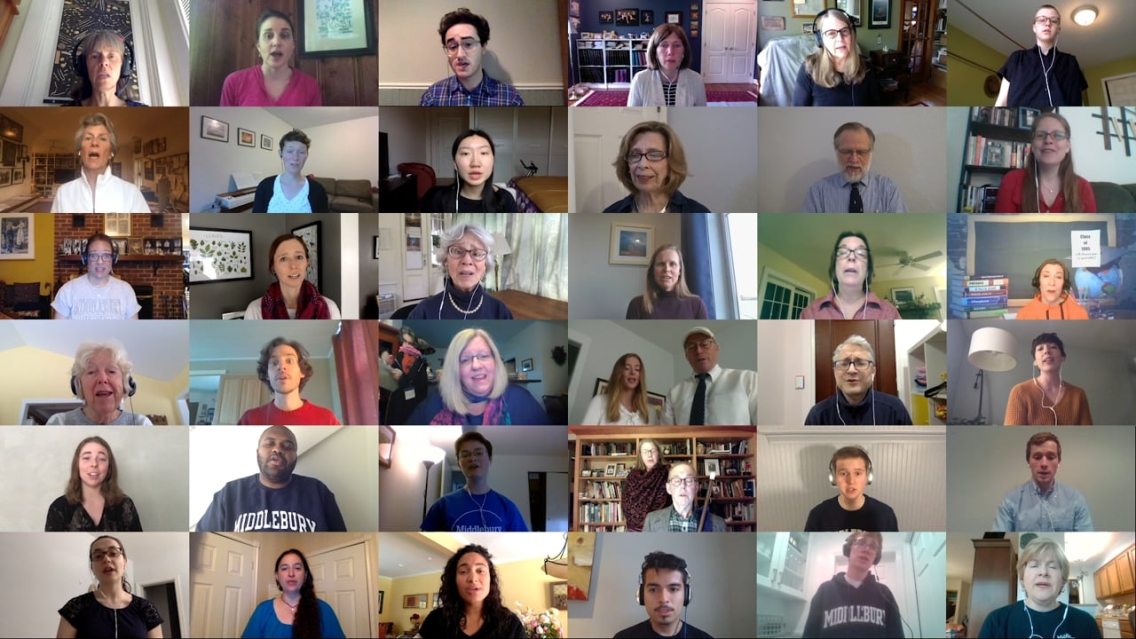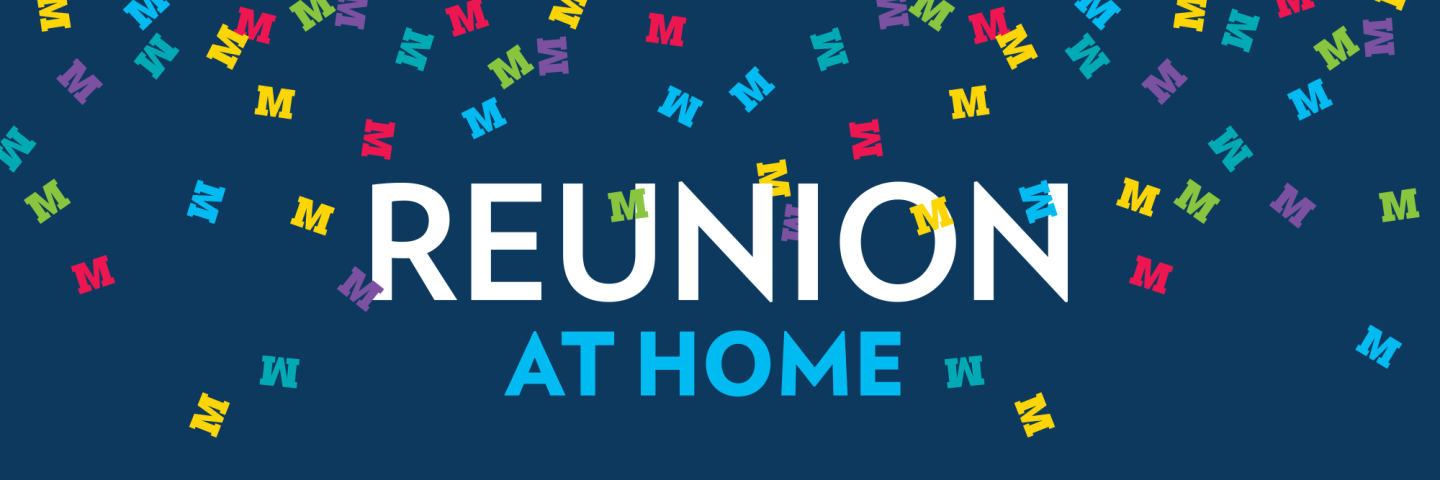
Reunion at Home
Error message
Could not retrieve the oEmbed resource.Welcome home to Middlebury, wherever you are! We may be apart, but we can still celebrate friendship, community, and shared experience.
Reunion 2021
We continue to work with the 1s and 6s classes to help plan and celebrate their milestone years. Please stay tuned for updates.
A Warm Welcome from President Laurie Patton
Welcome to Reunion at Home!
I’m Laurie Patton, president of Middlebury, and it’s my pleasure to welcome you to our virtual Reunion, as we look ahead to June 2021, when we hope to see you back on campus.
This is not the Reunion that you envisioned as you were planning your class’s celebration last fall. And like you, I was looking forward to celebrating your time at Middlebury and the community that you created as students and have nourished as alums.
But we will be together again, and our celebration will be all the more joyful for the isolation of the past months. As we navigate these difficult times—a global pandemic, economic insecurity, and the struggle for racial justice—our community and the care we take of each other is more important than ever.
Every day I hear stories that demonstrate the strength of the Middlebury community and the care we have for one another—stories of compassion, generosity, grace, resilience, respect for others, and commitment to justice.
I am inspired by our students, faculty, staff, parents, and by you, our alums.
Together, you have built something extraordinary over many decades, and our Middlebury community will endure.
Our oldest alums celebrating with us are from the Class of 1945, and many of them served in World War II. Our 50th reunion Class of ’70 were in the vanguard of the women’s and civil rights movements; they served in Vietnam; they helped to create the technological changes that we take for granted today. We all face enduring challenges—the struggle for racial justice, climate change, economic and international instability—and are finding collaborative, imaginative ways to address the intractable issues of our day. Alumni across the generations are leading consequential, creative lives and contributing to their communities—across the country and around the world.
I’m proud to be part of this community, and I look forward to seeing you in person and celebrating Reunion milestones on campus when it’s safe to do so. We are cautiously optimistic that we’ll be able to host an on-campus Reunion celebration for 0s and 5s the weekend of June 19, 2021. And we’ll be in touch with more information about that.
In the meantime, take care of yourselves and your loved ones. We miss you, but know we’ll see you here on these very lawns soon. We’ll save you an ice cream.
A Gift from the Grift
Middlebury alumni band and Reunion favorite the Grift wrote a song for you. (They’re missing Reunion, too.) Listen to it here.
Dance the Night Away
Bring the Reunion dance floor to your home with this Spotify playlist of Reunion favorites. Turn it up and hit the living room!
Take a Moment to Celebrate
Remember the friends you made, the place you grew up, the campus you love? Take a few minutes to explore Middlebury and experience Reunion online.
[Rufus Cushman ‘50]
It’s 1946, war memories are still fresh. Prison camps, Anzio, The Battle of the Bulge.
[John H. Von Hartz ‘55]
It all happened in our stone-and-ivy campus that looks exactly like what a college is supposed to look like.
[Nancy Mumford Mulvey ‘60]
On the cusp of change, passive non-rebels sang, “Bye Bye Love,” to the complacent ’50s and “Tear It Down” to herald the turbulent ’60s. Sputnik and stereo wowed us. Ugly Man, Carnival, and Frisbee entertained.
[Jeff Sturges ‘70]
Vietnam and Kent State, from passive patriots to active skeptics, black armbands at graduation.
[Bonnie Williams Flahive ‘70]
From naive boys and girls to young adults, eager to take on the world and committed to making a positive difference.
[Ralph Gardner ‘75]
By the time we graduated four years later, the war was over, Nixon and the draft were gone, and we were launched into a world, looking back upon it now, of unlimited promise.
[Rich Silton ‘80]
Technology was advancing from center, canter to gallop, analog to digital. Apple launched, laser printers appeared, the first commercial Concord flight took off, the space shuttle was unveiled. We waited in line to access the few computers in Voter Hall’s basement. The week we arrived, Chairman Mao died, two months later a relatively unknown Southern Governor was elected president.
[Brenda Birmann ‘85]
In 1981, Middlebury welcomed us with hikes and canoe jousting at Bread Loaf. We smirked when Olin Robison asked us to look to the left and to the right, yet we met new best friends and even best friends’ spouses that week.
[India Hixon Radfar ‘90]
We inhabited this sheltered basin of the Green Mountains, eating Ben & Jerry’s in our dining halls when Gorbachev announced Perestroika, when Chinese students braved tanks in the massacre of Tiananmen Square, when the Berlin Wall fell. Returning to the top of the mountain each winter, we surveyed and knew the landscape of snow-covered trees. Then flying down, tasting freedom, we became a part of nature.
[Janine Hetherington ‘95]
In our time we saw the end of fraternities, the beginnings of the environmental movement with our cups cups, the gay rights movement with Pink Triangles and Jeans Day, Take Back the Night marches and the first glimpse into the World Wide Web.
[Amy Liebowitz Shapiro ‘00]
We’ve grown up, had families, and moved all over the world. And the world has changed a lot since those days.
[Allie Beck ‘05]
The seeds for our now-global climate movement were planted in Jon Isham’s J-term course, nurtured by students in the Sunday night group, and then by scholar-in-residence Bill McKibben. This grassroots movement grew into 350.org, a vibrant force in the international campaign for climate action.
[Hannah Burnett ‘10]
Our time at Middlebury was characterized by sweeping change, both inside and outside the infamous bubble. Beyond our walls, our country was electing our first black president and the Great Recession was sending shock waves through the global economy. Meanwhile, inside our bucolic town, Starr Library was being refurbished and the Axinn Center opened. Quidditch was going from a lazy pastime to an international phenomenon. And the new biomass facility was turned on to push us toward carbon neutrality. We left after four years with great friends, incredible memories, and the words of Nicholas Kristof and Sheryl WuDunn ringing in our ears: “We may not be able to solve the problems of global poverty, illiteracy, or human trafficking, but we can help individuals and that’s a legitimate way of changing the world.” Five years later, we still have the friends, we still have the memories and we’re still trying to change the world.
Tap, Tap, Tap!
We teamed up with your class volunteers to make sure Gamaliel Painter’s cane made an appearance at Reunion. Watch how alumni found creative ways to share the cane across the miles and decades.
The Dissipated Eight (1984) [sung]:
When Gamaliel Painter died, he was Middlebury’s pride,
A sturdy pioneer without a stain;
And he left his all by will, to the college on the hill,
And included in his codicil a cane.
Oh, it’s rap rap rap, and it’s tap tap tap,
If you listen you can hear it sounding plain;
For a helper true and tried, as the generations glide,
There is nothing like Gamaliel Painter’s cane.
Oh, his blessed bones are hid ’neath a marble pyramid,
Forever there in honor to remain;
But he built us Painter Hall, noblest monument of all,
And he left to us his courage in his cane.
Oh, it’s rap rap rap, and it’s tap tap tap,
If you listen you can hear it sounding plain;
For a helper true and tried, as the generations glide,
There is nothing like Gamaliel Painter’s cane.
Oh, it’s rap rap rap, and it’s tap tap tap,
If you listen you can hear it sounding plain;
For a helper true and tried, as the generations glide,
There is nothing like Gamaliel Painter’s cane.
There is nothing like Gamaliel Painter’s cane. (His cane!)
The Mood Organs (2014) [sung]:
Oh, his blessed bones are hid ’neath a marble pyramid,
Forever there in honor to remain;
And he built us Painter Hall, noblest monument of all,
And he left to us his courage in the cane.
Oh, it’s rap rap rap, and it’s tap tap tap,
If you listen you can hear it sounding plain;
For a helper true and tried, as the generations glide,
There is nothing like Gamaliel Painter’s cane.
When Gamaliel Painter died, he was Middlebury’s pride,
A sturdy pioneer without a stain;
And he left his all by will, to the college on the hill,
And he left to us his courage in the cane.
Oh, it’s rap rap rap, and it’s tap tap tap,
If you listen you can hear it sounding plain;
For a helper true and tried, as the generations glide,
There is nothing like Gamaliel Painter’s cane.
There is nothing like Gamaliel Painter’s cane.
There is nothing like Gamaliel Painter’s cane.
There is nothing like Gamaliel Painter’s cane.
The Dissipated Eight (2020) [sung]:
When Gamaliel Painter died, he was Middlebury’s pride,
A sturdy pioneer without a stain;
And he left his all by will, to the college on the hill,
And included in his codicil a cane.
Oh, it’s rap rap rap, and it’s tap tap tap,
If you listen you can hear it sounding plain;
As a helper true and tried, as the generations glide,
There is nothing like Gamaliel Painter’s cane.
Oh, it’s rap rap rap, and it’s tappity tappity tap,
If you listen you can hear it sounding plain;
As a helper true and tried, as the generations glide,
There is nothing like Gamaliel Painter’s cane. (His cane!)
Reelin' in the Years
Take in 70 years of memories with this slideshow of photos and music from each Reunion class’s time at Middlebury. Skip to a specific year by clicking on the radio buttons in the video’s timeline.
What Can We Learn?
Every year, environmentalist and Schumann Distinguished Scholar Bill McKibben mesmerizes Reunion crowds. This year we’re bringing Bill to you online as part of the Faculty at Home series. Find out what we can learn about dealing with climate change from the pandemic.
Caitlin Knowles Myers:
Hi everybody. Welcome. It’s fantastic to see so many people joining us with such geographic diversity, such as one attendee noted age diversity. We’ve got folks from all different classes. We have parents. We have local friends of the college and faculty and students. So welcome to all to today’s webinar, which is part of Middlebury’s Faculty at Home series.
We started this series earlier this spring and have been cohosting it since March. Today’s webinar with Bill McKibben was the last one that we had a registration link up for. But I wanted to let you know that we have a new one being scheduled right now with Julia Alvarez who will speak with John Elder. Have a conversation about Julia’s new book, Afterlife. That’ll come up later in June, so keep your eyes peeled for that to pop up on the schedule.
And also we’ll be scheduling more webinars in the near future. As always, we want to thank the many people at the College who have made this series possible. Many thanks to our colleagues in the provost office, to colleagues in communications and advancement. We’ve been supported by the Andrew W. Mellon Foundation and the Engaged Listening Project, and we appreciate help from the Office of Digital Learning and Inquiry are [inaudible 00:01:43].
Thanks also to Justin Hitt and Jodi Felice who have been helping us with the technical side of this webinar. Now, I’m just about to turn it over to my colleague, Sarah Stroup in political science who will introduce today’s speaker. But first, I just have to notice that if you logged on early enough, you saw our slideshow welcoming you to today’s webinar. And it was driving me a little bit crazy that climate was misspelled. I want you to know that that is not our guest Bill McKibben’s fault. He absolutely, I promise you, does know how to spell climate. That was our mistake. So please forgive us.
Without further ado, I’ll turn things over to Sarah.
Sarah Stroup:
Thank you, Caitlin. Hello everybody. We have a big crowd today. I’m going to take just a minute to remind everybody about the logistics of our webinar. So if you’re watching us right now, you’re either in the Zoom room on a webinar, or you’re watching on the YouTube Live stream. If you’re in the Zoom room, you will be able to ask questions at any time using the button at the bottom of your screen that says Q&A. We’re going to turn off the chat in just a couple of minutes so that we minimize distractions. But Caitlin and I will be monitoring the Q&A throughout the discussion today and we will try to get to as many of your questions as possible.
We apologize in advance. We have hundreds of people here today, but we’re going to consolidate, move quickly, and get to your great questions. We’ll run for about 45 minutes and then to respect everybody’s time, we’re going to stop right about at 1:00 PM today. As you know, you signed up to speak with Bill McKibben, and we are really fortunate to have him joining us.
This is hard for me. I have to introduce someone who needs no introduction so I’ll keep it short. Bill is the Schumann Distinguished Scholar in Environmental Studies at Middlebury College. He is a founder of 350.org, a prolific author and a very busy activist. His writing demands our attention with book titles like The End of Nature, Enough and Falter. He’s also very deeply connected to this place that I and many of you call home or have called home at some point.
And so if you’re in Vermont as I am right now, I highly recommend the book that I read when we first moved here. Wandering Home. Starting at Mount Abe right above his home today. Among Bill’s many honors, he is a fellow of the American Academy of Arts and Sciences. Has honorary degrees. Many other titles. But most importantly is a gracious supporter of Middlebury College. Thank you, Bill, for joining us today. The floor is yours.
Bill McKibben:
Well, Sarah, what a pleasure to be with everybody and to get to join you all. This is kind of fun to see people in the kind of big, broad Middlebury community spread all over the place. And I’ve seen people in the chat already who are starting their 50th reunion week. And also people who have just been admitted to the college and haven’t gotten to even come here yet because as you know, things are a little nuts right now. It’s a real pleasure also to just see some of my colleagues on hand. Rich Wolfson and Brett Millier and Karl Lindholm and Jon Isham and probably some others who I haven’t seen because that stream is moving by very fast.
But you should know that it’s been a strange but in some ways quite beautiful season for Middlebury and the college that people handled the desperately difficult task of sending everybody home mid-semester with real love and care. And then taught their hearts out all spring. I’m fresh on some of this material because I was teaching a big course on global warming. We have more than 100 kids enrolled, which is very unusual for Middlebury. And so I ended up teaching the second half of it from the chair where I’m talking to you now, which was odd. But it worked some too. And it wasn’t the same as people being on campus, and it wasn’t the same to have a virtual graduation. And it wasn’t …
None of that’s the same. But the spirit of this place really has continued to permeate. And I will tell you also that it’s been a beautiful few weeks in Vermont, these last few weeks. Spring has come and come hard. In fact, maybe a little harder than we wanted. We had the highest temperature ever recorded on top of Mount Mansfield three or four days ago when it reached 85 degrees up there close to 5,000 feet. And then this morning, there was snow up there. So we’re back and forth.
I want to talk about the world that we’re in right now. This is maybe the hardest week in that world, at least in the US, in a very, very long time. And so let’s just talk about how these crises all fit together. I was finishing up my column. I write a newsletter each week for the New Yorker on the climate crisis. And this week, trying to figure out a little bit how to talk about the thing that’s foremost on everybody’s mind, this onslaught of police violence and reaction to it across the country. And I do think it’s really important that we keep what’s happening in very much in our hearts and minds.
One of the things that sometimes surprises people when I tell them it is that the two groups in this country who are by far, if you do surveys and polls, the most concerned about climate change are Latino Americans and African Americans by very large margins. And of course once you stop to think about it for a while, you know why. It’s because they’re doing the kind of jobs and living in the kind of places that are often the most hardest hit by heatwaves and droughts and so on and so forth. In just the same way that they live in, often, in the kind of communities where things like policing that many of us take for granted are desperately tough.
And if we’re going to be environmentalists, then we need to really think about all the things that constitute an environment. I was digging up some of the research on what happens to communities when you’re dealing with police brutality. That way that it causes all kinds of things, like diabetes and stroke and ulcer and stress and autoimmune disorder and accelerated aging. All the kind of things that we’re also fighting when we worry about the way that these same communities host coal-fired power plants and so on and so forth. John Mueller once said, “When we try to pick out anything by itself, we find it hitched to everything else in the universe”, and he was right. And not just about ecosystems. He was right about our political systems and things as well.
So, that in mind, let’s talk about this COVID crisis and what it means for climate change. What it feels like to be where we are right now. I try to think of a few of these ideas a few weeks ago when 60 Minutes came up to interview me. We did an outside, socially distanced interview at the Frost Cabin, which was really fun. But on a very serious, very serious topic. And here are the lessons, it seems to me that are really key to take from where we stand right now. One is, and it sounds trite and cliched to say, but one is that … well, that reality is real.
We’ve lived for a long time now in ways that are pretty insulated often from the natural world. And the last couple of decades we’ve spent an awful lot of our time behind screens where everything seems editable and mutable and so on. So, it’s perhaps forgivable that we’ve come to take for granted physical reality to some degree or another. To view the physical planet really for the first time in human civilizations as a kind of backdrop against which the really important stuff plays out. But that’s not how it is. I’ve spent the last couple of decades trying to convince people that physics and chemistry are very real. That they don’t compromise. That you can’t force them to negotiate. That if the carbon molecule heats up the planet and you’ve got to put less of it in the atmosphere.
The COVID microbe is teaching us the same lesson about biology. It doesn’t matter how much our leader fulminates about it being a hoax or it’s going to go away by Easter or whatever. He’s not in charge. The microbe is. And if it says, “Wear a mask”, then by all means, please wear a mask. And I must say I’m very happy to see everybody around Middlebury wearing masks. The reality of climate change at the moment is bitterly depressing and difficult. 2020 may well turn out to be the hottest year that we’ve ever recorded. If not, it’ll be the second hottest. You remember that the year began with all of us somewhat awestruck at the prospect of Australia half burning to the ground.
And there’s been an onslaught of bad news since from every corner of the natural world. And I wish I could tell you that it was going to get better. It’s not. It’s going to get much worse before it gets better. We’ve raised the temperature of the planet one degrees Celsius so far. But as Rich Wolfson will tell you, we are on track to raise it three or three and a half degrees Celsius if we keep doing what we’re doing at the moment. And if we do, then we won’t have civilizations like the ones we’re used to having. So the test that we’re going through now, this test of the pandemic, it’s the beginning of a series of tests that our species are going to be undergoing in the decades ahead.
So lesson one. Reality is real. Lesson two, corollary to that, perhaps, is that when you’re dealing with reality, speed often matters a good deal. You know, we’ve learned a lot about what it takes to flatten a curve in the last little while. And much of it tragic. When historians look back at the COVID pandemic, one thing that they will note is that the US and South Korea logged their first fatality on the same day in January. Now, South Korea went straight to work. They disrupted large gatherings and they started testing everybody all the time.
They’re not over their crisis. They continue to have secondary infections and things. But they’re kind of looking at in the rear view mirror. We of course didn’t do that. We wasted February doing nothing. Somehow expecting it to go away. And when it didn’t, and when it hit us with a vengeance, then we had to disrupt life far more than the South Koreans did. We had to lock everybody in the house. And even having done that, we suffered and will continue to suffer horrendous casualties. Both economic and mortal. I mean, we’ve lost a hundred thousand of our countrymen in these last weeks to something that had we acted more quickly, would not have been as devastating.
That idea that speed matters is, of course, very palpable to those of us who work on climate change. Because it’s been the central lesson we’ve been trying to get across. For February of 2020 with the COVID crisis, read the last 30 years for the climate crisis. Having been given a strong and powerful warning by the scientific community, we basically did not heed it as the world and certainly as a nation didn’t take dramatic steps to deal with it. In fact, human beings have emitted far more carbon since that warning came in about 1990 than in all of human history before. So, that’s put us in a very, very difficult place. We still have to move very, very fast. Indeed, the Intergovernmental Panel on Climate Change has made it clear in 2018 that if we haven’t made fundamental transformations of our energy system by 2030, which they defined as cutting emissions in half, then the chance of meeting the targets that we’d agreed on in Paris in 2015 would go by the board.
10 years is a very short period of time. We’re going to have to disrupt things and disrupt them in large ways in order to have any hope of meeting targets like that. And even if we do, we’re obviously at this point, not going to stop global warming. What we’re playing for now is stopping it short of the point where it makes civilizations impossible. And whether we can still do that or will is an open question at this point. The best science indicates that we have that narrow window. But we have to move with enormous speed.
So that leads to me to what I think is the third and in some ways most powerful lesson of all that comes out of this. And that’s that social solidarity is absolutely necessary. Importance of the first order. Many of us have spent our political lives living kind of in the shadow of Ronald Regan who reconfigured our political thinking. And around the idea that markets would solve most problems. That government should get out of the way. That government was the problem, not the solution. That if we each pursued our individual well-being, everything would work out.
Reagan’s most famous laugh line in his speeches was always the nine scariest words in the English language are I’m from the government and I’m here to help. But we’re well aware now that those are not the scariest words. The scariest words in the English language are things like we’ve just run out of ventilators. The hillside behind your house has caught on fire. And those you can’t solve one person at a time. Those you require a working government to solve. And I think one of the things that we’re all … makes this moment in our history so uniquely scary is the sense that we’ve let that working government, in too many cases, kind of slip away now.
We’re going to have to build it back. We’re going to have to make some way for that social solidarity to really work. And here, let me just for a second brag on Vermont. There was some data yesterday released about which states around the union had done the best job of changing in March when we had to, when it became clear that we had. And it turned out that no state in the union had done things like cut driving as much as the State of Vermont. And I think that that reflects in large measure the fact that this is a place that retains a higher sense of that social solidarity of community. Of course as you know, people in Vermont govern their affairs with local town meetings. It’s a state largely made up of villages. And so those are good things to keep in mind.
What does that social solidarity look like as it plays out? Well, one of the things that we’re clear on, I’m afraid, is that we’re going to come out of this pandemic with the worst economic trouble we’ve had in generations. Maybe since the Great Depression. And of course it was the Great Depression that gave rise to the New Deal and to the idea that we would work together to make sure that people had jobs and that those jobs got done. Projects that were important to the future, to what came next. To resetting ourselves for the next phase in our lives. And so we all still have the libraries and the trails and all the other things that the WPA or the CCC or whatever built in the 1930s.
If you look around the world now for what jobs there are that would require tens of millions of newly unemployed hands to do, what the societal task is that we have to undertake, I don’t think you can really come up with one that can sop up labor or is as necessary as the task of transforming our energy systems. Take tens of millions of buildings and retrofitting them to be energy efficient. Taking a transportation system and changing it so that it can run on electricity and human muscles. It’s a lot of bike paths that have to get built.
Taking an energy system and changing it so that it doesn’t run on coal and gas but runs on sun and wind. Now, you could have said the same thing coming out of our last financial crisis in 2009 or so. But a couple of things have changed since then that may make this a better time to be doing this. One of them is that the engineers have really done their work. The price of a solar panel or wind turbine of a kilowatt of electricity that comes from renewable energy, it’s plummeted over the last decade. It’s down something like 90%. These are now the cheapest ways to generate power around the world.
There was an auction two weeks ago. New power tender in Dubai in the Middle East for what will be the largest solar array in the world and it’s going to be producing electricity that they’ll be selling it just over a penny a kilowatt-hour. Granted, that’s in the best place in the world for it. The flat, sunny deserts of the Emirates. But it’s pretty much the same around the world. This is the cheapest way now to do things. So that’s good economic and technical factors don’t stand in the way.
The other thing that’s maybe good, hopefully we’ve done something is that for the last 10 years, a kind of activist movement has risen whose biggest goal has been to weaken the power of the fossil fuel industry. Because of course that’s what stood in the way more than anything else of making progress at the pace that we needed to make progress. We know now from great investigative reporting that the big fossil fuel companies knew everything there was to know about climate change way back in the 1980s.
And they’re well aware of what was going on. I mean Exxon scientists told them exactly what would happen and they were believed. Exxon started building all their drilling rigs to compensate for the rise in sea level they knew was on the way. But instead of telling the rest of us, they all banded together to build this kind of architecture of deceit and denial and disinformation that kept us lock for 30 years in a completely phony debate about whether or not global warming was real. A debate that both sides knew the answer to at the beginning. It’s just one of them was willing to lie. And it turned into the most consequential lie in human history, precisely because it cost us those decades.
That’s why so many of us went to work trying to weaken their political power. And this is a case where if you admire that work, you can be very proud of your alma mater because a lot of it began at Middlebury and with the students that came out of John’s class and that worked with me to form 350.org and together have built what became the first iteration of a global grassroots climate movement that was laser focused on the fossil fuel industry in a number of ways. One was trying to slow the construction of their new projects like the Keystone Pipeline which turned into a fight about fossil fuel infrastructure the world over. We’ve won a good many of those fights, and that’s been good.
And the other has been this effort to financially to cut off the financial lifeline to these companies. That’s why this divestment fight became so big, and it’s turned into the largest campaign of its kind in history. Middlebury has obviously played an important role there. And I’m happy to see it. Middlebury was one of the first places that having originally said no then changed its mind and said, “Yes. We are going to divest.” That was a smart financial decision, but it also opened up the floodgates. And in recent times, we’ve seen just massive, massive commitments. Even in the last couple of weeks. Oxford in the UK. Cornell in New York. The University of California system with its $120 billion endowment and pension fund. Joining together in what’s now a $14 trillion effort that’s caused a great weakening for the fossil fuel companies.
Some of you may know the stock picker on television. Jim Cramer. Biggest stock guru in the States. And in January, he went off on a thing one night about how there was no money left to be made in fossil fuel because there had been so much divestment. Divestment had just made it impossible. On and on and on he went. That was a very, to me, a very good sign. So what it means is that we’re at a place when we have the technology to do what we need doing. And we have perhaps a political opening that we haven’t had in the past and so we need to put it together very fast with a series of programs that looks something like what the young people are called the Green New Deal. A strong emphasis on building out renewable energy around the world.
Keeping carbon in the ground with oil wells and fracking wells and coal mines and so on and so forth. Doing major work around energy efficiency and around transportation to change in fundamental ways what it’s like going forward. I think that this is one place also where the pandemic is illustrated just what kind of change we need. We’ve come closer to shutting down the economy than anyone ever envisioned. I don’t know about you, but I know almost no one who has been on an airplane for months or taken a long trip or anything like it. And emissions fell some, but they didn’t really fall all that much. Not as much as you might have expected as a result. 10, 15%. Something like that. Which is an indication that while individual action is obviously important, so much of this is hardwired into our systems.
And so we’re going to have to go into the guts of those systems and pull them out and rewire them. And we’re going to have to do it fast and it’s going to require precisely that social solidarity I described. This, I think, has to be the task that brings us back together as a country and as a world, because it’s a task we have to undertake and it’s a task we can only undertake together. They don’t call it global warming for nothing. So to me, those are the lessons that this spring teaches us as we emerge from our homes tentatively into this world. We better figure out how to transform this world and do it with some speed.
I’m going to stop there because I’ve rattled on for a ways to take questions from y’all. But just before I stop, there’s one more thing I want to say which is that it’s my mother’s 90th birthday today. We obviously can’t be with her, because they don’t allow it. But I think she’s managed to join us via Zoom and if she has, I just wanted to say happy birthday, mom. Many happy returns.
Sarah Stroup:
Thank you, Bill. Happy birthday to your mother from me as well! I know that many of us are missing out on really important moments in our family lives. And just those human connections that make the sort of solidarity that you talk about possible. So thank you for that. We have so many great questions coming in from the audience, so I think I’ll get right to them. If we’re thinking about the connection between our current crisis which seems to be a short-term emergency in this sort of long-term emergency that you’ve dedicated your career to, I wonder if you can talk a little bit more about how we deal with human nature as we try to address the problems that we’ve created in nature. One way to read the pandemic is that we’re pretty good at responding seemingly imminent threats for a short period of time, but our willingness to pay the costs of the shutdown, of quarantine, only lasts for so long.
Can you talk a little bit about how we build that social solidarity? And maybe I’ll put this in the words of a student question that came in. [Elian Helizter 00:28:56] who was a thesis advisee and IPE major asked, “How do we, in the current polarized political climate, make environmental advocacy an issue that crosses party lines?”
Bill McKibben:
So these are very good questions. And it must be said that one of the reasons why we reacted, I think, pretty well to the pandemic … I mean, I’ve been actually … Yes. There are an endless supply of pictures that you can find of knuckleheads out for inexplicable reasons, out at restaurants or whatever it is, standing in swimming pools with a hundred other people [inaudible 00:29:37]. But for the most part, people did the right thing and that was very good.
One of the reasons is, thankfully, there’s not a trillion dollar industry whose business model depends on us all dying of coronavirus. And there is a trillion dollar industry whose business model depends on us postponing action on climate change. That’s why we’ve worked so hard to try and weaken that force. Now, we haven’t been entirely successful. It’s still very strong. And it’s one of the reasons why partisan polarization around this is so strong. Those of you who are political scientists can describe this in even better terms than me.
But in the most basic form, the oil and gas industry managed to purchase one of our political parties about 20 years ago. The Koch brothers, our biggest oil and gas parents, literally have provided far more in the way of resources than any other player in our political system. They spent more on the last round of elections than the Republican National Committee and Democratic National Committee combined. Okay? Those two guys, one of whom is no longer with us. So it’s difficult to figure out how you stop polarization. Except that there are things that people really do agree on. When we do polling, one of the things we find is that everybody loves solar power.
Now, I think people may love it for different reasons. My sense sometimes with conservative Americans is, it’s like my house is my castle and now I’ve got solar panels on the roof and I never have to talk to anybody again. Which is fine. And for liberals it’s like, wow, the power of the sun is connecting us all and … okay. That’s good too. We can work with that, you know? We can say, “Here’s where we’ve got to be pushing hard to spend money in the years ahead.” Especially since doing that work requires a lot of hands which we now have.
Your solar panel is not going to erect itself. No one’s going to put their house on a boat and send it to China to get it insulated. That’s work that has to be done here with the hands that are now in need of something to do. And so there really are important possibilities here if we get some leadership. If we don’t, well, it’s going to be a long stretch.
Sarah Stroup:
As a follow-up question, we have some people, you mentioned some different adherents to climate change as a political priority across our political parties. Have you been doing any work recently, asked Jennifer Brinkerhoff, which presidential campaigns or other leadership campaigns in 2020 about advancing the agenda of say, a WPA for retrofitting industry and transportation? More generally, how do you advise that we all work to advance this agenda?
Bill McKibben:
So this is a very good question. And I’ve been doing some. Less than the last time around, and I’ll explain why in a minute. But there is a lot of good work going on. And a lot of it’s coming from young people. Here’s an interesting story. We started this whole big divestment campaign all across America and all across the world, and young people on campus did a huge amount of it. Campus after campus after campus. And when they got out, they wanted to keep working in this fight but they weren’t on campus anymore, so they formed this thing called the Sunrise Movement, and that birthed the Green New Deal. They were the ones who rounded up AOC and Ed Markey and others to kind of be there. Provide some leadership.
But it’s all young … the woman who’s in charge, wonderful woman named Varshini Prakash, four or five years ago was the person who managed to force UMass to divest from fossil fuel. So I know all of these people and work with them a lot, and I’m very happy to see, for instance, that Varshini has been named along with Gina McCarthy and John Kerry to the committee that’s figuring out between Bernie and Joe Biden and things how to move forward on this stuff.
I’ve been kind of content myself this year to let these guys do a lot of the political work, because we’ve been very focused on the financial community. The other lever that’s big enough to pull that might make some big difference. And we formed this thing called Stop the Money Pipeline that really focused on banks and insurance companies and asset managers. And we’ve had some real luck there. More perhaps than I would have expected and more quickly. After a year of really profound campaigning, Black Rock, which is the biggest … well, it’s the biggest box of money on planet Earth. I mean, something like one dollar in eight in the world rests in its digital vaults. Black Rock came out with some very strong statements about climate change and how it was going to have to be the thing that determined financial decision making going forward.
And they’re beginning to make good on those words. Just last week they voted their large number of shares very powerfully at the Chevron and Exxon shareholder meetings and we’re beginning to see progress made. We saw Chase Bank, biggest fossil fuel lender in the world, biggest bank in the world, demote its long-time board chair who’d also been the CEO of Exxon once upon a time. So we’re making some progress there, too. It’s these two things, the financial lever and the political lever that are big enough to pull that give us, I think, some possibilities here.
Sarah Stroup:
Great. And that really helps answer some questions that came in about activism for young people. So [Lorie Rocha 00:35:54] had asked, “What advice would you give to my 16 year old daughter who is interested in the climate crisis but can’t vote? You’re suggesting a lot of ways to build the coalition.”
Bill McKibben:
Yeah. And you know what? I mean, this is a very interesting thing. I mean, there was a period of time when people were worried that young people were being apathetic or so on and so forth. Worry no more. Young people are a mile ahead of the curve on this. I mean, I started 350.org with college students. So I’ve known for a long time that young people were completely engaged. But in the last few years, forget college students. It’s now high school and junior high school students that are doing so much of the work. It’s been a real pleasure to get to know and work with Greta Thunberg in the last 18 months or so. But the even better news is there are tens of thousands of Gretas around the world. Young people who are really aware and really effective organizers. And what fun to get to see that happening.
The only thing that worries me sometimes is that they’re doing such good work that the rest of the … everybody else is just going to take the biggest problem that we’ve ever had on this planet and off load it onto the shoulders of high school sophomores. And that’s not okay. Their job is to demand, provide the moral witness that comes with knowing that they’ll have to live through another seven or eight decades of what’s coming. Our job is to take them up on that and provide the resources, political and economic, to make sure that our big institutions change and change fast.
Sarah Stroup:
You talked about political polarization. You also mentioned who in our communities cares the most or is effected most by climate change. So we’ve got a couple great questions that have come in about connecting climate change and the impacts of climate change to the other things that people feel really urgently. So questions about racial divisions, economic inequality. One questioner says, “Many people don’t see themselves in the environmental movement. Given the crises that are so evident after a difficult weekend, how do we make people feel connected?”
Bill McKibben:
Well, I think these are very good questions. And of course one of the most important things about climate change is that it really is the first thing that affects everybody. Of course, it affects those, sadly, who did the least to cause it the first and the hardest. One of the things I have known for a decade or more since I started working on this, I mean, I remember the day that the seven of us who started 350.org had our first … which was all planned out. Our office was like tables, proctor and then the grill and things. But we had our first big global day of action in 2009 and people were sending in pictures from their actions around the world.
As it turned out, we exceeded our expectations. There were 5,200 demonstrations in 181 countries. CNN called it the most widespread day of political action in the planet’s history. And it really did all come out of Middlebury in some sense. But we didn’t organize it. We just sort of sent out the word. It was like a potluck supper. And as people, those pictures rolled in from around the world, it took me about 10 minutes of watching them to realize that I’d always been told that environmentalism was something that rich, white people did. And if you didn’t know where your next meal was coming from you wouldn’t be an environmentalist and on and on and on. It took 20 minutes to realize that was nonsense. Most of the people we were working with were poor and black and brown and Asian and young, because that’s what most of the world is made up of.
And what do you know? Are just as concerned, more concerned with climate change. That’s been the leadership of the climate justice movement in the last decade, especially the amazing growth of indigenous environmental activism on this continent but all over the world. Those have been some of the most inspiring parts of this fight. So, we got to keep growing it. And one way to do it is to be in solidarity with other people all the time as we go through these traumas, to understand that there are deep links between why it is that we build coal-fired power plants where we do and why it is that we have brutal police forces where we do. You know?
If you live in a nice suburb some place, you don’t really deal with either one of those. But if you live in center city some place, you deal with both of them. That’s why black people in this country die of asthma at three times the rate of white people. And that discrepancy, that hideous discrepancy is mirrored around the world. One of the interesting things about the pandemic was that there were places on this planet where people got their first lung full of clean air they’ve ever got. We were worried about damage to lungs from COVID as we should be. But of the five million young people in Delhi, in India, we think two and a half million of them have irreversible lung damage just from breathing the air, okay?
So, that’s why we got to think about these things as a package, as a unit. As part of the same scandal of inequality and discrimination and short-sightedness and vested interest, and it’s why as we build our way of them we’ve got to be building on all fronts.
Sarah Stroup:
The questions are coming in faster than I can ask them. And we’re running shorter on time. I think we have time for two more. I’ll group a bunch of questions together here. Because a lot of people are asking about specific alternate energy sources. They’re asking about biomass. Asking about nuclear. They’re asking about hydrogen. And this reminds me of the way in which we are all kind of arm chair epidemiologist right now, right? Trying to keep up with the changing science and understanding gene mutation and those sorts of things. Can you talk a little bit about how you digest the science around energy usage, and what you find to be the reliable sources of information for thinking about the best sources?
Bill McKibben:
We’ve been doing a lot of this in class as we’ve been working through this year of course. And the two things just to bear in mind are one, don’t burn anything if you can avoid it. Don’t burn wood. Don’t burn gas. Don’t burn oil. Don’t burn coal. Because when you do, you put carbon in the atmosphere. And the second thing is, you have to pick solutions that are economical enough that we can actually do them. The price of a solar panel or a wind turbine has just plummeted over the last decade. But the price of other things, nuclear power plants, whatever, continue to go up. So my guess is that’s where most of our progress is going to come from.
And I recommended actually, I was just reading this and digesting it for the New Yorker thing last week. I try to keep everybody sort of schooled and up to date on this weekly free New Yorker climate newsletter I do. So if you’re interested, you can track it down. But I was referring to a great set of new papers by an economist and analyst. A guy named Ramez Naam. N-double A-M. And if you just Google his name and the phrase, “Solar is insanely cheap”, you’ll get some sense of what the economics are like going forward. This could be a truly transformative period, simply because we’re now able to produce … it is a miracle. You point a sheet of glass at the sun and out the back comes all the things you want.
Sarah Stroup:
My last question focuses on the role of education, something that those of us with a connection to Middlebury really value deeply. Before I get to it, I must say that Margaret McKibben says, “Please tell Bill thanks from his mom.” But if you can, talk a little bit about what an education to prepare for this world looks like especially at a time when science, as an institution, and a basic shared understanding of facts seem elusive. Science is under attack. We don’t agree on what the world looks like. So what is the role of educators in preparing our students to tackle these challenges?
Bill McKibben:
Well, this is a really good question, Sarah, on which to end. And also a chance to just say to everybody such thanks for their support of Middlebury and for being part of this community. I missed this year … normally people let me … are kind enough to let me come talk to reunion classes. And I always enjoy being in Mead Chapel and talking to the reunion classes. And I’m really sorry that we can’t do that this year. And look forward to the, I guess it would be the aught classes and the five classes gathering together before long in some kind of thing. But you should be awfully proud of your alma mater. The climate crisis is the perfect, if there ever was one, reminder of why liberal arts education is the most important thing, gift that it’s possible to imagine.
You can’t deal with this one discipline at a time. Look, physics and chemistry have been really important in understanding it and environmental science. But we have to understand. Think of the things we’ve just talked about a little bit today about psychology and human psychology and how it works. About political science. About economics. Theology. Sociology. On and on and on. Every discipline is required both to understand and to act on the crisis that we are in. And we can’t have it siloed by discipline because if we’re not talking to each other about it, then we have no chance. That’s why not only are the liberal arts really important, but the liberal arts on a scale where if students and faculty are in constant communication and conversation with each other is so important.
I don’t think it’s any accident that 350.org and in some ways, hence, much of the climate movement, came out of places like Middlebury. Because it’s precisely the incubator for just that kind of thing. We’re running over time. But I just really wanted to say thanks to everybody for that. Because if we don’t have institutions like this, if we don’t have this institution, then we don’t have that kind of chance. The leverage that comes from a place like Middlebury is enormously high. And supporting it is one of the most important ways to support action going forward on the deepest issues of our time. So I’m awfully grateful to all the people who do. And we’ll look forward very much to seeing you on campus or on the cross country ski trails at Bread Loaf or all the other places that we’re hoping are back open to everybody before very much longer.
Sarah Stroup:
I share your hope. We get to be together in person even if not. We take very seriously our responsibilities as educators, and it’s great to be part of this community. Thanks so much for joining us today, Bill. I’ll turn things over to Caitlin to sign us off.
Caitlin Knowles Myers:
Thanks, Sarah. Thanks, Bill. This was fascinating, informative, and inspiring. And just one more act of service in your long career of service. I also want to extend a shout out to all of our alums, but in particular the classes of the aughts and the fives. One particular member, we’re going to do a little bit of a mom day thing. My mother-in-law is a member of Middlebury College class of 1970. Sue Fischer MacMartin. She’s here right now. So I just want to say hi, and hi to her classmates, and everybody else who is missing coming to campus this year for a reunion weekend. We can’t wait to have you back in the future.
I also want to say hi to my kids who are watching. And I never talk about my kids on these webinars, but my students would tell you I do in class all the time. I tell stories about them. And I have a little one to sign us off with that is related. We were watching the news last night with our four kids who are 11 to 18, including an incoming Middlebury student, and it was so tough. It was so tough to see. I want to talk to them about what’s happening, honestly. But also it’s tough as a parent to navigate these images on the screen. And my 13 year old turned to me and she said, “This is just too much. Climate change. What’s going on in politics. COVID. Police violence. Unrest. This, it’s all so horrible.” And I said, “I know it’s probably hard to believe this”, but I am one of those parents who always tells it to you straight. So hopefully not. “Yeah. This is a scary moment on multiple fronts. And it’s a moment where we have really important decisions to make on multiple fronts.” And yet, I see this hope.
I had this moment of hope that I haven’t had before. I’m seeing a level of humility of reaching out of trying to understand, of trying to question, of trying to understand things from a different perspective on so many fronts that makes me think that yeah, we’re seeing that the fabric of our society is torn in a way that we didn’t understand. Or maybe just that we thought we were, we’d entered a social contract with people and they see it very differently and we’re coming to understand.
But I also see people trying so hard right now. People from across the political spectrum. People in my life who voted very differently from me, to have new conversations. And so Bill, I really appreciate your cause to community and society, to our young people and to the adults who have responsibility. I do feel hope in this moment. And thanks to everybody for joining us. I know that this is a hard moment for so many of us, but as always, we end with our call to action. As we struggle, if you are in a position of being able to extend a helping hand to your neighbor, we know you will. We hope that you’ll support the college, and we hope that you’ll support the institutions in your local community that are on the front lines of these incredibly important battles. Thanks very much, and we hope to see you when Julia Alvarez joins us on the 22nd. Bye to all!
A Sky Full of Bells
Every year, the carillon calls alumni home to Mead Chapel for Convocation. Hear the bells as longtime carilloneur George Matthews sets them singing in this montage.
The Alma Mater as You’ve Never Heard It
Members of the Middlebury choir and a cappella groups across the generations teamed up to sing the Alma Mater for you. You’ll never hear the song the same way again.
Hang Out With Friends
We can’t be together in person this June, but you can find friends in your class’s Facebook group. Join, post photos from now and then, start a conversation, or set up a Zoom party.

Make the Match
Make a gift in celebration of your Reunion, and Middlebury trustees will add an extra $100 to it. And thank you to everyone who’s already made the match!
MAKE YOUR GIFT
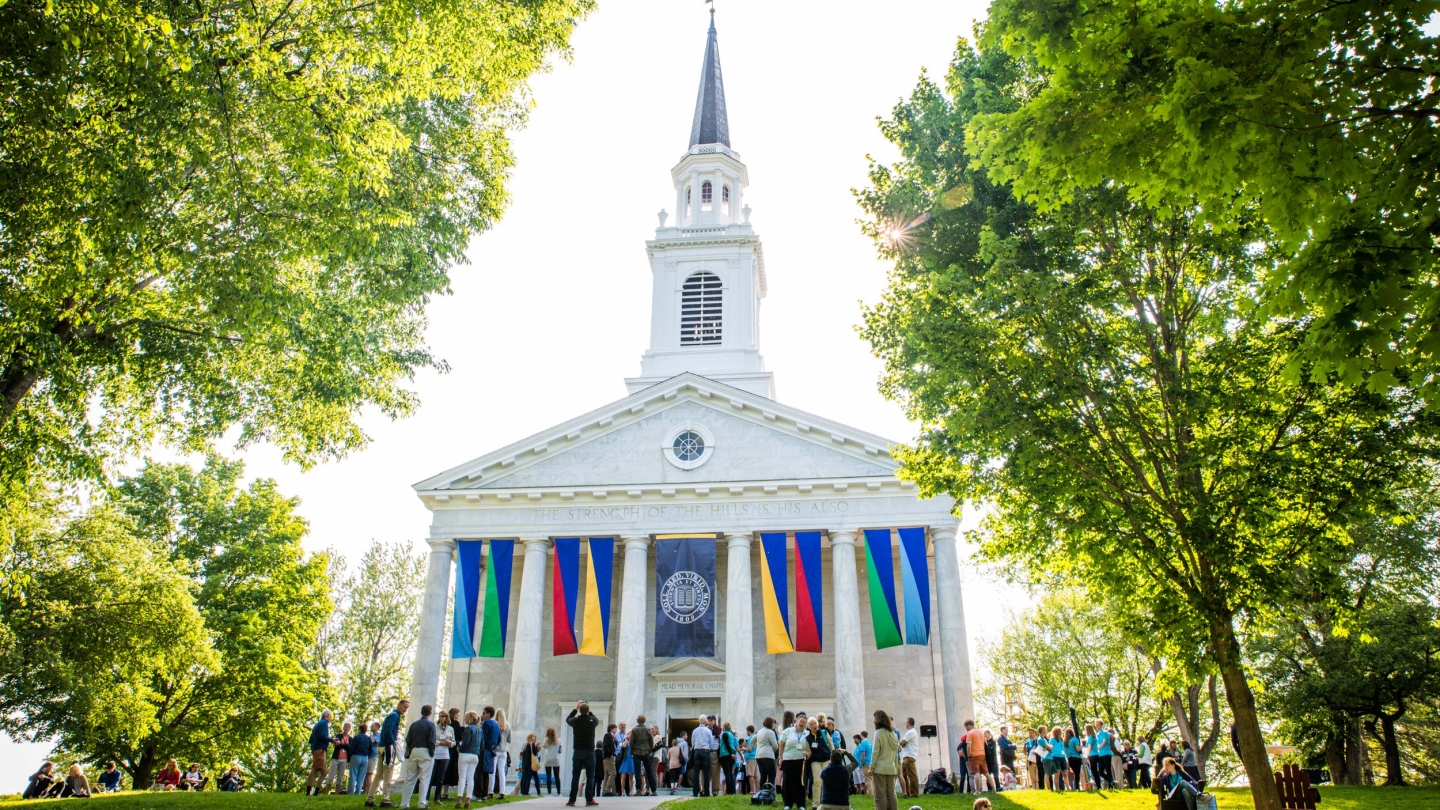
We’ve Got Your Back(ground)
Download photos of your favorite places on campus, aerial overviews, mountain vistas, and Reunion moments. You’ll find all these and more in our gallery of Reunion and Middlebury images. You can use also purchase prints by clicking on the “buy” button in the album.


